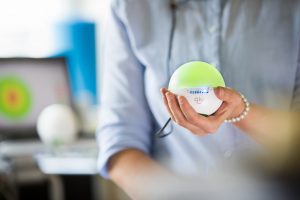The solution is to change
kPNI is a new specialty in modern medicine. Many chronic illnesses have their origins in the patient’s particular circumstances. External and internal stressors, a disturbed sleep rhythm, lack of exercise and a diet that is not appropriate for us humans are important factors here. The consequences are low-grade inflammation, insulin resistance, intestinal barrier disorders and chronic activation of the hormonal stress axis.
Methods of kPNI are lifestyle interventions, stress management, regulation of chronobiology, exercise and nutrition concepts, orthomolecular medicine and targeted psychological interventions.
Heart rate variability (HRV)
Health is flexibility

Heart rate variability is a new term in clinical psychoneuroimmunology. HRV checks the state of the autonomic nervous system. The balance of both parts, i.e. the sympathetic versus the parasympathetic nervous system, is measured. Each heartbeat has its own heart rate and is the product of this equilibrium and should increase or decrease depending on inhalation and exhalation, i.e. be variable.
The parasympathetic nervous system, also known as the nocturnal nerve, is important for sleep, digestion, physical regeneration, wound healing and recovery. If the sympathetic nervous system is in continuous operation, the parasympathetic nervous system cannot perform its function sufficiently. This can lead to sleep disorders, digestive disorders, fatigue, exhaustion and chronic inflammation.
The HRV measurement can thus visualize the stress affecting the patient. A constant steady heart rate indicates excessive sympathetic activity. This is also reflected in the calculated biological age compared to the actual age of the patient. A Qiu is used as a home exercise program to improve HRV.


